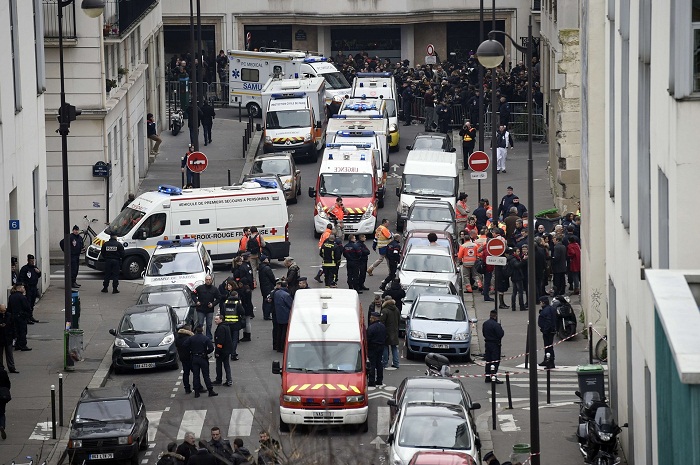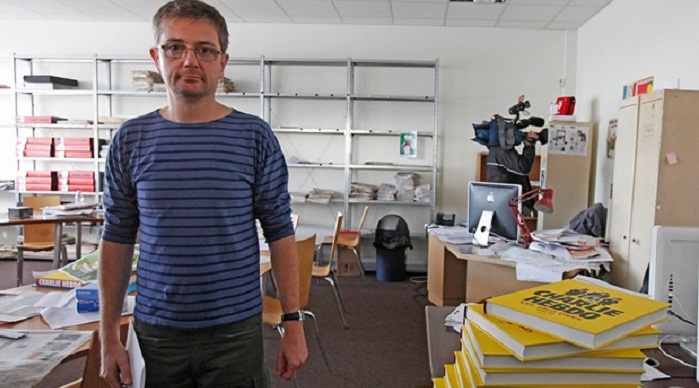These events are covered in a new documentary, Je Suis Charlie, which premiered at the Toronto film festival this week. Directed by father-and-son team Daniel and Emmanuel Leconte, the film reuses clips from Daniel’s previous documentary, It’s Hard Being Loved By Jerks, to introduce a wider audience to the Charlie staff – including prominent cartoonists Charb, Cabu and Tignous – who were killed. Footage of the dead – working, arguing, singing karaoke in their downtime – is cut together with eyewitness accounts from the survivors of the attack.
“It was the first time I heard a gunshot,” says cartoonist Corinne Rey (known as “Coco”), who survived after being forced at gunpoint to let the masked attackers into the packed conference room. “It’s a really shitty noise. Nothing at all like the movies. Just ‘tak-tak’.”
Emmanuel Leconte says he and his father were keen to bring the attention back to the staff of the magazine. He believes the fundamental point – that no one deserves to die for exercising their right to free speech – has been lost in the debate since. “We have to put the focus back on them,” he says. “Everybody’s asking: ‘Is it politically correct to say this? Can we show the cartoons of Charlie Hebdo? What are they doing with the money?’
“What are you guys talking about? It’s a distraction. Everybody dived into that because they couldn’t cope with what happened.”
The Charlie Hebdo attack was followed the next day by the killing of police officer Clarissa Jean-Philippe in the Montrouge suburb of Paris by Amedy Coulibaly, an accomplice of the Kouachi brothers. A day later Coulibaly would kill a further four people at a kosher supermarket in Porte de Vincennes. The Leconte’s film pays tribute to these victims also. Emmanuel believes the combination of targets was symbolic.
“It was obviously part of a plan,” he says. “You attack a whole nation by attacking an element of culture – something that’s emblematic of an open society – such as Charlie Hebdo; attacking the police force – an institution; and attacking the Jews.”
Charlie Hebdo’s staff have not let the attack dilute the power – or, depending on your view, the offensiveness – of their work. In their latest issue, they include a selection of “the covers you were spared”. Among them two pictures that play on the image of the drowned Syrian toddler, Aylan Kurdi, to mock Europe’s adoption of the photos of his body as a totem for the migrant crisis. One shows Kurdi, face down in the sand next to a billboard for McDonald’s – a Banksy-esque comment on the selling of consumerism to the poor. The other, published under the headline “The Proof That Europe is Christian” showed Jesus walking on water next to a drowning boy. The caption reads: “Christians walk on water, Muslim children sink.”
There has been outrage, especially in Britain and the US. But French journalists claimed the target of the cartoons’ satire had slipped in translation and the magazine’s artists protested that the joke had been misunderstood. “Buy yourself a brain,” Charlie illustrator Coco said to Society of Black Lawyers chair Peter Herbert after he called the magazine “a purely racist, xenophobic and ideologically bankrupt publication”. In truth, no amount of explanation from the Hebdo staff is going to quell the outcry over the use of that image in their work, even if the outrage strengthens their point.
Emmanuel believes this kind of reaction is why many people who became part of the Je Suis Charlie movement have found themselves conflicted over whether they “are Charlie” any more. “People rallied around emotion with Charlie Hebdo,” he says. “Charlie Hebdo loves to take the piss out of emotion as well. I think people are going realise: ‘I supported them and now they’re making fun out of this?’”
The magazine has always ridiculed the sacred, he says. “You can’t make a deal with freedom of speech saying: ‘Listen guys. I support you as long as you say this, this and this.’ That’s the wrong newspaper to do that with. They’re taking the piss out of everything. It’s just that the targets they are taking the piss out of have become more and more violent and out of hand.”

Daniel’s previous film, It’s Hard Being Liked by Jerks, quizzed the late Charlie Hebdo illustrators about the court case brought against them by the Muslim World League and the Union of French Islamic Organisations, which claimed the publication was racist. The magazine’s then editor, Philippe Val, was acquitted after the court ruled the magazine was ridiculing terrorists, not Islam.
It’s Hard Being Liked by Jerks was an intellectual exercise, says Daniel. Je Suis Charlie is very much an emotional one. “Killing cartoonists is killing France,” he says. “It’s like people felt like the fundamental values of the country were going to be strong forever. The shootings made them feel they weren’t.”
It is this that brought the millions into the streets, he says. “Four million people on the streets was the most important demonstration since the liberation of Paris. But it’s going to play a big role in the reaction against fundamentalism. [The killers] touched on something very deep in the French culture and the French identity.”
At Je Suis Charlie’s Toronto premiere, there are two special guests: the current managing editor, Laurent “Riss” Sourisseau, and Eric Portheault, the magazine’s finance manager. Both saw their colleagues killed, but survived the attacks. In the film, Portheault talks about how his dog came and lay across his face to protect him.
Before they take to the stage at the Bloor Street Hot Docs cinema, armed police are stationed in the lobby and at the back of the screening room. Riss addresses the crowd. “It’s always been hard to make Charlie Hebdo,” he says. “The events of January put our backs to the wall. We were wondering, could we continue? It became a real political struggle. But we want to continue to erase what the terrorists tried to do.”
More about:













































